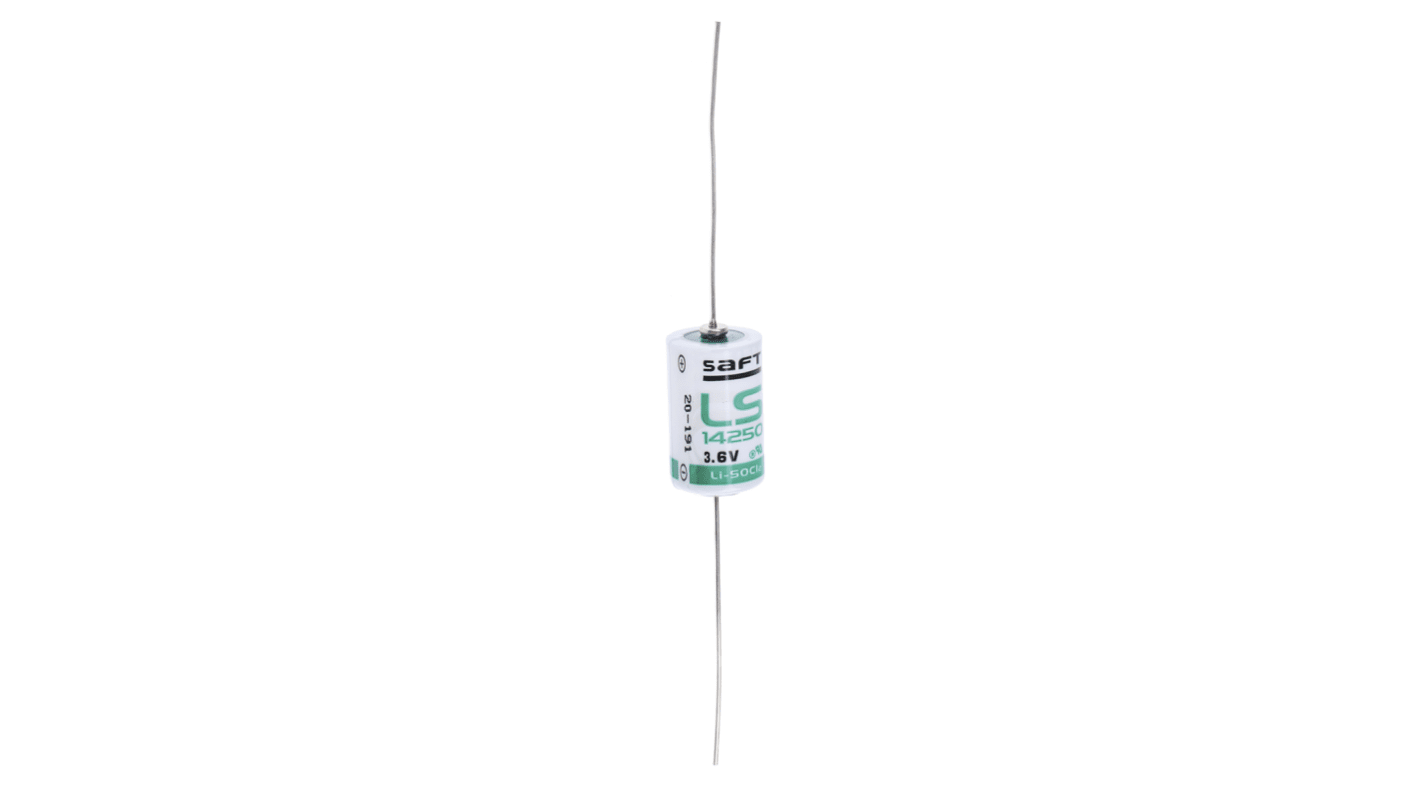Saft Lithium Thionyl Chloride 3.6V, 1/2 AA Battery
- RS Stock No.:
- 436-4768
- Mfr. Part No.:
- LS14250CNA
- Brand:
- Saft

Subtotal (1 unit)*
£12.66
(exc. VAT)
£15.19
(inc. VAT)
FREE delivery for orders over £50.00
In Stock
- 785 unit(s) ready to ship
- Plus 281 unit(s) ready to ship from another location
- Plus 420 unit(s) shipping from 12 December 2025
Need more? Click ‘Check delivery dates’ to find extra stock and lead times.
Units | Per unit |
|---|---|
| 1 + | £12.66 |
*price indicative
- RS Stock No.:
- 436-4768
- Mfr. Part No.:
- LS14250CNA
- Brand:
- Saft
Specifications
Technical Reference
Legislation and Compliance
Product Details
Find similar products by selecting one or more attributes.
Select all | Attribute | Value |
|---|---|---|
| Brand | Saft | |
| Size | 1/2 AA | |
| Nominal Voltage | 3.6V | |
| Chemistry | Lithium Thionyl Chloride | |
| Capacity | 1.2Ah | |
| Terminal Type | Wire Lead | |
| Dimensions | 14.55 x 25.15mm | |
| Select all | ||
|---|---|---|
Brand Saft | ||
Size 1/2 AA | ||
Nominal Voltage 3.6V | ||
Chemistry Lithium Thionyl Chloride | ||
Capacity 1.2Ah | ||
Terminal Type Wire Lead | ||
Dimensions 14.55 x 25.15mm | ||
RoHS Status: Exempt
SAFT Lithium Non-rechargeable Batteries - LS
These batteries are not like typical batteries, they have a nominal voltage rating of 3.6 V designed for use in applications where a device is used for a long period of time such as utility metering, security and alarms.
LS batteries use lithium-thionyl chloride so they have a high energy density, low discharge rate, ideal for lengthy storage periods plus they are fully compliant with IEC60086-4 and IEC60079-11 safety standards.
LS batteries use lithium-thionyl chloride so they have a high energy density, low discharge rate, ideal for lengthy storage periods plus they are fully compliant with IEC60086-4 and IEC60079-11 safety standards.
Why choose these batteries?
Saft LS lithium batteries are 3.6 V rated which is considerably higher than commonly used batteries. They are applicable for equipment or instruments designed for this rating otherwise damage will ensue. Saft LS lithium batteries are non-rechargeable and should not be recharged.
Lithium batteries what are the advantages?
• The nominal voltage of 3.6 V, greater than conventional cells
• Wide temperature range −60゚C to +85゚C
• High energy density, the highest of any primary battery
• Wide temperature range −60゚C to +85゚C
• High energy density, the highest of any primary battery
Features and Benefits
• Operating voltage: 3.6 V
• Bobbin construction
• Low self-discharge for extended life
• Operating temperature: - 60°C to + 85°C
• Non-flammable
• Resistance to corrosion
• Low magnetic signature
• Size options; 1/ 2 AA, 2/ 3 AA, C and D
Typical Applications
Lithium batteries are used in electronic devices that require a small, compact source of power. Example applications include:
• Utility Meters
• Smoke detectors
• Alarm systems
FAQ’s
Are Lithium Batteries Harmful ?
Lithium batteries can sometimes leak a substance called potassium hydroxide which is a caustic agent that can cause eye, skin and respiratory irritations. This risk is reduced by not mixing different manufacturer battery types, batteries of different chemistries and by the replacement of all batteries at the same time.
How to dispose of Alkaline/Lithium Batteries?
Recycle responsibly, a wide range of schemes are available.
Safety Advice
Keep out of sight and reach of children
Guidance
• Always install the batteries correctly as per instruction
• Ensure that the contact points are clean and conductive
• Do not mix different types of battery
• Do not heat or attempt to recharge the battery
• Do not dispose of in a fire
• Operating voltage: 3.6 V
• Bobbin construction
• Low self-discharge for extended life
• Operating temperature: - 60°C to + 85°C
• Non-flammable
• Resistance to corrosion
• Low magnetic signature
• Size options; 1/ 2 AA, 2/ 3 AA, C and D
Typical Applications
Lithium batteries are used in electronic devices that require a small, compact source of power. Example applications include:
• Utility Meters
• Smoke detectors
• Alarm systems
FAQ’s
Are Lithium Batteries Harmful ?
Lithium batteries can sometimes leak a substance called potassium hydroxide which is a caustic agent that can cause eye, skin and respiratory irritations. This risk is reduced by not mixing different manufacturer battery types, batteries of different chemistries and by the replacement of all batteries at the same time.
How to dispose of Alkaline/Lithium Batteries?
Recycle responsibly, a wide range of schemes are available.
Safety Advice
Keep out of sight and reach of children
Guidance
• Always install the batteries correctly as per instruction
• Ensure that the contact points are clean and conductive
• Do not mix different types of battery
• Do not heat or attempt to recharge the battery
• Do not dispose of in a fire
Note
Due to the high terminal voltage 3.6V they are not suitable as direct replacements for other battery technologies in the same can sizes
Warning
Market demand for this product has caused an extension in lead times, delivery dates may fluctuate.
Approvals
Compliant with IEC 60086-4 safety standard
Related links
- Saft Lithium Thionyl Chloride 3.6V, 1/2 AA Battery
- RS PRO Lithium Thionyl Chloride 3.6V, 1/2 AA Battery
- Varta Lithium Thionyl Chloride 3.6V, 1/2 AA Battery
- Tadiran Lithium Thionyl Chloride 3.6V, 1/2 AA Battery
- Ansmann Lithium Thionyl Chloride 3.6V, 1/2 AA Battery
- Tadiran Lithium Thionyl Chloride 3.6V, 2/3 AA 2/3 AA Battery
- Saft Lithium Thionyl Chloride 3.6V, 2/3 A Battery
- Saft Lithium Thionyl Chloride 3.6V, 2/3 A 2/3 A Battery
